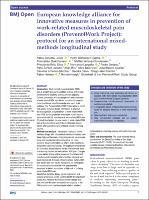Please use this identifier to cite or link to this item:
https://repositorio.usj.es/handle/123456789/699
| Title: | European knowledge alliance for innovative measures in prevention of work-related musculoskeletal pain disorders (Prevent4Work Project): Protocol for an international mixed-methods longitudinal study |
| Authors: | Bellosta-López, Pablo


Doménech-García, Víctor 

Palsson, Thorvaldur S. 


Christensen, Steffan Wittrup Mc Phee 

de Brito Silva, Priscila 
Langella, Francesco 


Berjano, Pedro L. 


Jensen, Palle S. 
Riis, Allan 

Baroncini, Alice 
Blasco-Abadía, Julia 
Jiménez Sánchez, Carolina 
Calvo, Sandra 
Jaén-Carrillo, Diego 


Herrero Gállego, Pablo 


Hoegh, Morten S. 

|
| Keywords: | Musculoskeletal disorders; Occupational & industrial medicine; Pain management |
| Issue Date: | Sep-2021 |
| Publisher: | BMJ Publishing Group |
| Citation: | Bellosta-López P, Domenech-Garcia V, Palsson TS, et al. European knowledge alliance for innovative measures in prevention of work-related musculoskeletal pain disorders (Prevent4Work Project): protocol for an international mixed-methods longitudinal study. BMJ Open 2021;11:e052602. doi:10.1136/ bmjopen-2021-052602 |
| Abstract: | Introduction: Work-related musculoskeletal (MSK) pain is a highly prevalent condition and one of the main contributors to disability and loss of work capacity. Current approaches to the management and prevention of work-related MSK pain do not consistently integrate current evidence-based knowledge and seem to be outdated. The Prevent4Work (P4W) Project aims to collect and spread evidence-based information to improve the management and prevention of work-related MSK pain. P4W will longitudinally investigate (1) risk factors associated with the prevalence of work-related MSK pain, (2) predictive factors for new events of work-related MSK pain in the short term and (3) the modification of pain beliefs after participating in evidence-based e-learning courses. Methods and analysis: This project employs a mixed-methods design with international cohorts of workers from Spain, Italy and Denmark. All participants will be assessed using self-reported variables at baseline (ie, cross-sectional design) with follow-up after 3 and 6 months (ie, prospective-predictive design). Throughout the first phase (0-3 months), all participants will be offered to self-enrol in e-learning courses on work-related MSK pain. Changes in pain beliefs (if any) will be assessed. The dataset will include sociodemographic characteristics, physical and psychological job demands, lifestyle-related factors, MSK pain history and pain beliefs. At baseline, all participants will additionally complete the P4W questionnaire developed to detect populations at high risk of suffering work-related MSK pain.Descriptive statistics, binary logistic regression, and analysis of variance will be used to identify the significant factors that influence the history of work-related MSK pain, evaluate the short-term prediction capacity of the P4W questionnaire, and investigate whether workers' participation in e-learning courses will modify their pain beliefs. Ethics and dissemination: The study received ethical approval from the Ethical Committee of San Jorge University (USJ011-19/20). The results will be made available via peer-reviewed publications, international conferences and P4W official channels. |
| URI: | https://repositorio.usj.es/handle/123456789/699 |
| ISSN: | 2044-6055 |
| Appears in Collections: | Artículos de revistas |
Files in This Item:
| File | Description | Size | Format | |
|---|---|---|---|---|
| European knowledge alliance for innovative measures in prevention of work-related musculoskeletal pain disorders.pdf | 543,71 kB | Adobe PDF |  View/Open |
This item is licensed under a Creative Commons License

